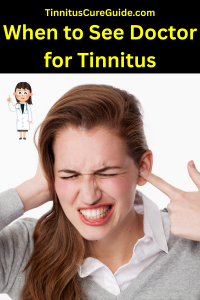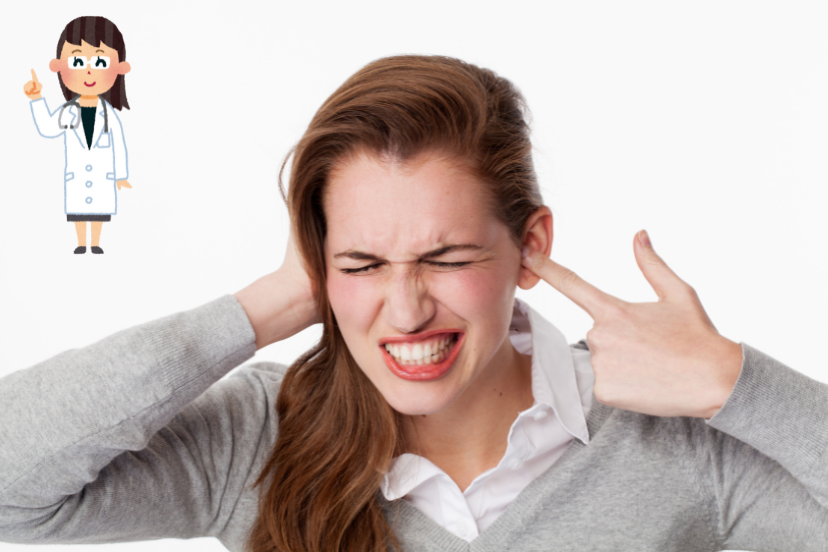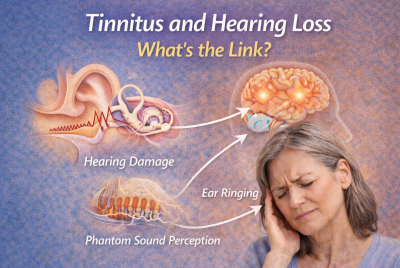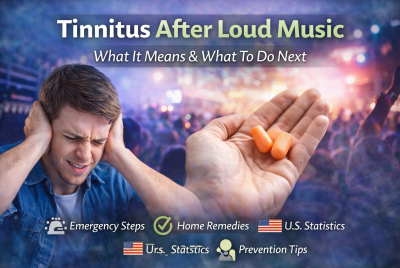When to See Doctor for Tinnitus: Signs You Shouldn’t Ignore
If you’ve ever experienced constant ringing, buzzing, whooshing, or high-pitched noise in your ears, you already know how frustrating tinnitus can be. For some people, it’s just an occasional annoyance after a concert or loud event. For others, it becomes chronic ear ringing that interferes with sleep, concentration, and daily comfort.
So, how do you know when to see a doctor for tinnitus? While many cases are temporary and harmless, some symptoms can signal an underlying health condition that requires medical attention. This guide will help you understand causes, warning signs, treatment options, and prevention strategies — so you know exactly when it’s time to make an appointment.
Quick Answer
You should see a doctor for tinnitus if it is sudden, happens in one ear only, matches your heartbeat, comes with hearing loss or dizziness, or significantly affects sleep or daily life. Temporary tinnitus after loud noise often improves within hours to days, but persistent or unusual symptoms should be evaluated.
What Is Tinnitus?
Tinnitus is the perception of sound when no external source is present. It’s often described as:
• Ringing In The Ears
• Ear Buzzing Sound
• Clicking Or Humming
• Pulsing Or Whooshing In Ears (Pulsatile Tinnitus)
• High-Pitched Ear Noise
Tinnitus itself is not a disease — it’s a symptom linked to hearing, nerve, or circulatory system factors.
Common Causes Of Tinnitus
Some of the most common contributors include:
• Hearing Loss — Age-related or noise-induced damage
• Loud Noise Exposure — Concerts, Headphones, Machinery, Gunfire
• Ear Infections Or Blockages — Wax buildup or fluid
• Medications — Some antibiotics, chemotherapy drugs, high-dose aspirin
• Circulatory Issues — Blood pressure or vascular flow problems
• Jaw or Neck Problems — TMJ disorders, injury, muscle tension
• Stress and Anxiety — Can increase brain awareness of sound signals
Nervous System And Whole-Body Context: Why Tinnitus Feels Loud
Tinnitus is not only about the ears. It involves how the brain processes sound signals.
When hearing input drops (like with hearing loss), the brain may “turn up the volume” internally to compensate. Stress hormones can also increase sound sensitivity by activating the nervous system’s alert response.
This is why tinnitus often feels worse during:
• High Stress Periods
• Poor Sleep
• Illness Or Fatigue
• Anxiety Or Overstimulation
This doesn’t mean symptoms are imagined — it means multiple body systems interact.
When To See A Doctor For Tinnitus
Most short-term tinnitus improves on its own. However, a medical evaluation is important if you notice:
Sudden Tinnitus
If ringing appears suddenly and doesn’t fade within 24–48 hours, it may relate to sudden hearing loss or inner ear injury.
Tinnitus In One Ear Only
Single-sided tinnitus sometimes points to structural or nerve-related causes and should be evaluated.
Pulsatile Tinnitus
A heartbeat-like whooshing sound may relate to blood flow or vascular pressure.
Tinnitus With Hearing Loss Or Dizziness
This combination may suggest inner ear disorders requiring evaluation.
Tinnitus That Disrupts Daily Life
If tinnitus affects sleep, concentration, mood, or work function, evaluation helps identify management options.
What This Often Feels Like In Real Life
Many people describe experiences like:
• Noticing Ringing Only In Quiet Rooms At First
• Waking Up At Night Because Of Ear Noise
• Struggling To Focus In Silent Offices
• Feeling More Aware Of Ringing During Stress
• Hearing Pulsing Sound When Lying Down
Real-world patterns help distinguish temporary irritation from symptoms worth checking medically.
Real Life Scenario
Scenario Example:
You go to a concert Saturday night. On Sunday morning, you notice a ringing. By Tuesday, it’s mostly gone — this is common noise-related temporary tinnitus.
Different Scenario:
You wake up with strong ringing in one ear, plus muffled hearing and dizziness. That situation should be evaluated quickly.
Self-Assessment Checklist: Does This Apply To You?
You may benefit from a medical evaluation if you notice:
• Ringing Lasting More Than 3–7 Days
• Sound Only In One Ear
• Pulsing Or Heartbeat-Like Noise
• Hearing Loss Or Ear Fullness
• Balance Problems Or Vertigo
• Sudden Symptom Onset
• Tinnitus After Head Or Neck Injury
• Symptoms Affecting Sleep Or Mental Health
Typical Recovery Pattern (Recovery Timeline)
Temporary Tinnitus Pattern
• Hours to 48 Hours — Noise exposure ringing is common
• 2 To 5 Days — Often gradually fades
• 1 To 2 Weeks — Usually resolves if temporary
Persistent Tinnitus Pattern
• 2 To 4 Weeks — Brain begins adapting
• 1 To 3 Months — Many people report reduced awareness
• 6 To 12 Months — Often becomes background sound for many
Note: Individual timelines vary significantly.
Comparison Table: Temporary Vs Concerning Tinnitus
| Feature | Often Temporary | Needs Medical Evaluation |
|---|---|---|
| Duration | Hours To Few Days | Weeks Or Persistent |
| Location | Both Ears | One Ear Only |
| Trigger | Loud Noise | Sudden, No Clear Trigger |
| Sound Type | Ringing Or Buzzing | Pulsing / Heartbeat |
| Other Symptoms | None | Hearing Loss, Dizziness, Pain |
Decision Support: Monitor Or See A Doctor?
When Monitoring At Home Is Reasonable
• After Known Loud Noise Exposure
• If Symptoms Improve Daily
• If No Hearing Loss Or Dizziness
• If Both Ears Are Affected
When Medical Evaluation Is Important
• Sudden Hearing Changes
• One-Sided Tinnitus
• Pulsatile Sound
• Neurological Symptoms
• Severe Sleep Or Function Impact
Expectation Vs Reality
Expectation: Tinnitus always means a serious illness
Reality: Most cases are linked to hearing system changes or noise exposure
Expectation: Tinnitus must be cured to improve the quality of life
Reality: Many people improve through management and brain adaptation
Expectation: Supplements or devices work instantly
Reality: Most management tools require consistency and time
How Doctors Diagnose Tinnitus
Doctors may:
• Review Medical History And Medications
• Perform Ear Examination
• Order Hearing Test (Audiogram)
• Request Imaging If Needed
• Refer To ENT Or Audiology Specialist
Treatment And Management Options
Medical Approaches
• Hearing Aids — Improve sound input and reduce tinnitus awareness
• Sound Masking Devices — White noise or environmental sound
• Medication Adjustments — If drug-related
• Treat Underlying Conditions — Blood pressure, infection, TMJ
Sound Therapy And Brain Adaptation
Tinnitus retraining therapy and sound therapy help reduce the brain’s focus on tinnitus signals over time.
Lifestyle And Natural Support Strategies
• White Noise At Night
• Relaxation Techniques
• Stress Reduction Practices
• Evidence-Aware Supplement Exploration (With Doctor Guidance)
Coping Strategies For Daily Life
• Avoid Loud Environments
• Use Hearing Protection
• Limit Caffeine And Nicotine If They Worsen Symptoms
• Maintain Sleep Routine
• Use Tinnitus Support Apps
Tinnitus Prevention Tips
• Protect Hearing In Loud Settings
• Follow Safe Headphone Volume Habits
• Manage Stress Levels
• Support Cardiovascular Health
• Schedule Hearing Checks After Age 50
Expanded FAQ: When To See A Doctor For Tinnitus
Is Tinnitus Ever Dangerous?
Usually not, but certain patterns (sudden onset, one ear only, pulsatile sound) should be evaluated.
Can Stress Alone Cause Tinnitus?
Stress usually doesn’t cause tinnitus alone but can increase perception and severity.
Should I Go to the ER For Tinnitus?
Emergency care may be appropriate if tinnitus appears suddenly with hearing loss, severe dizziness, or neurological symptoms.
Can Dehydration Or Illness Make Tinnitus Worse?
Yes, temporary body stress can increase symptom awareness.
Does Tinnitus Always Mean Hearing Loss?
Not always, but hearing changes are commonly associated.
What If My Tinnitus Changes Sound Or Volume?
New changes are worth discussing with a provider, especially if sudden.
Conclusion: Don’t Ignore Important Warning Signs
Tinnitus doesn’t always mean something serious, but knowing when to see a doctor can protect hearing and overall health. Sudden, one-sided, pulsatile, or life-disrupting tinnitus should be evaluated.
With the right evaluation, lifestyle adjustments, and sound or behavioral strategies, many people learn to manage tinnitus successfully and reduce its daily impact.
Disclaimer
This article is for informational purposes only and is not a substitute for professional medical advice, diagnosis, or treatment. Always seek the advice of your physician, audiologist, or other qualified healthcare provider with questions regarding tinnitus or other medical conditions. Never ignore or delay medical advice because of something you read here.







